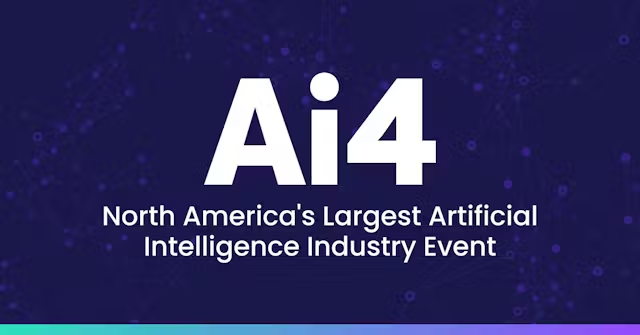[.green-span]Deploying AI Agents Across the Enterprise: Insights from Ai4 2025[.green-span]

At Ai4 2025, a diverse panel of leaders gathered to unpack one of the most pressing challenges in artificial intelligence today: how to successfully deploy AI agents at scale across enterprises and for end customers. The session brought together voices from investment, fintech, payments, consulting, and AI infrastructure:
- Zach Gronfein, Investor, Sound Ventures
- Barkha Saxena, Chief Data & AI Officer, Chime
- Jon Fry, CEO, Lendflow, Inc.
- Jatin Dave, Managing Director, AI, Deloitte
- Federico Cohen Freue, Senior Vice President, AI & Data Operations, Mastercard
Together, they painted a nuanced picture of where AI agents are driving value, where enterprises are getting stuck, and what it will take to responsibly scale adoption.
From “AI Tourism” to Real Deployment
Moderator Zach Gronfein set the stage by describing today’s enterprise AI landscape as a period of “AI tourism.” Many companies are experimenting with overlapping solutions, knowing that consolidation and long-term partnerships are inevitable.
Jatin Dave of Deloitte emphasized how this experimentation often fails to translate into impact. Deloitte’s research shows that only 30% of AI proof-of-concepts make it to production. Even fewer achieve measurable adoption.
The most promising use cases, he noted, are those directly tied to core business processes—beyond just customer service or IT productivity. For example, in wealth management, AI copilots aren’t just note-takers; they proactively detect key details (like a client mentioning a new grandchild) and surface actionable insights (e.g., recommending a 529 plan).
Yet challenges remain: unreliable data, weak measurement strategies, and the lack of structured adoption programs. Without solving these, even the most advanced AI agents fail to stick.
AI Agents Transforming SMB Lending
Jon Fry of Lendflow shared a pragmatic perspective from the small business lending world. Traditionally, the application and underwriting process was labor-intensive, with high human capital requirements and long turnaround times.
Voice and process agents have transformed that reality. By automating application completion, document collection, and lead follow-ups, Lendflow’s agents improve both conversion rates and speed to funding.
Beyond efficiency, Fry highlighted an overlooked dimension of ROI: customer experience. AI agents provide consistent, responsive touchpoints—something especially valuable when serving smaller customers who may have previously been unprofitable to support. That improved experience not only increases conversions but also builds trust and retention.
“ROI doesn’t always have to be financial,” Fry reminded the audience. “It can be about retention, trust, and long-term health of the business.”
Secure AI Payments: Closing the Loop
The conversation then turned to the future of autonomous commerce. While some industry leaders remain skeptical, Federico Cohen Freue of Mastercard argued the shift is already underway.
Consumers are increasingly using AI agents like ChatGPT, Claude, and Gemini for product discovery. The missing piece is payment. Mastercard’s AgentPay initiative addresses this by allowing AI agents to securely execute transactions on behalf of users.
The key, Cohen Freue stressed, is trust and guardrails. Any system that allows agents to spend money must be as seamless and secure as tapping a card at checkout. That means embedding safeguards into the network so that every transaction reflects the user’s true intent.
Guardrails and Compliance in Fintech
The panel closed with a discussion on one of the thorniest issues: how to responsibly govern AI agents.
Barkha Saxena of Chime described how her team approaches the problem in a regulated fintech environment. For Chime, adoption begins with clarity: which use cases matter most to members, how success will be measured, and what data is required.
Chime integrates AI, data, risk, and compliance teams from the start—treating agents like full-fledged product launches. This ensures that data compliance, regulatory adherence, and member experience are baked into the design process, not bolted on later.
“Every dollar counts,” Saxena said. “We don’t just experiment for the sake of it. We invest where AI agents can truly deliver measurable value for our members.”
Key Takeaways
The panel surfaced a few themes that every enterprise leader should keep in mind:
- Focus on Core Value Drivers: Agents succeed when tied to business-critical processes, not just generic productivity boosts.
- Measure Beyond Financial ROI: Trust, retention, and customer experience are equally important outcomes.
- Guardrails Are Non-Negotiable: From fintech compliance to secure payments, governance must be integrated from day one.
- Adoption Requires Design: AI tools must be productized with user-centric success metrics, not treated as optional pilots.
As enterprises move past “AI tourism,” the winners will be those who align experimentation with strategy, execution with compliance, and efficiency with human experience.










.png)

.png)


